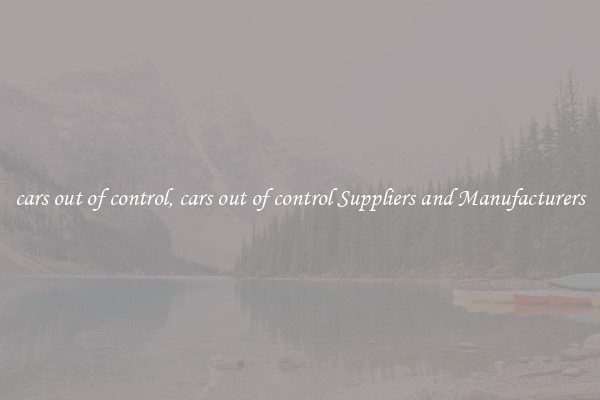cars out of control, cars out of control Suppliers and Manufacturers
Cars Out of Control: The Impact on Suppliers and Manufacturers

In recent years, there have been several high-profile cases of cars going out of control, leading to accidents and even fatalities. These incidents have caused significant concerns within the automotive industry, particularly for suppliers and manufacturers. Not only do such incidents tarnish the reputation of the companies involved, but they also have far-reaching consequences for the entire supply chain.
One of the main challenges faced by suppliers and manufacturers is the potential damage to their brand image. When a car goes out of control, it is often seen as a failure of the vehicle's design or production. Consumers start questioning the safety and reliability of the brand, which can lead to a decline in sales and a loss of customer trust. This, in turn, puts pressure on the suppliers and manufacturers to rectify the issue quickly and effectively.
Furthermore, car recalls resulting from out-of-control incidents can have a significant financial impact on the companies involved. From covering the costs of repairs and replacements to potential lawsuits, the expenses can mount up rapidly. This strain is not limited to the direct cost of recalls but also extends to the indirect costs, such as lost sales opportunities and potential damage to long-term business relationships.
Another issue that suppliers and manufacturers face relates to the legal and regulatory consequences of cars going out of control. Governments and regulatory bodies often tighten regulations and impose stricter standards in response to such incidents. This increased scrutiny requires suppliers and manufacturers to invest more resources in ensuring compliance, conducting extensive testing, and implementing stricter quality control measures. Compliance costs, along with potential fines, can put a strain on the financial stability of these organizations.
To mitigate these risks, suppliers and manufacturers are increasingly prioritizing safety measures and implementing robust quality control systems throughout their production processes. This includes utilizing advanced technologies, such as smart sensors and artificial intelligence, to detect and prevent potential issues. Collaborating with independent testing and certification organizations for external verification is also becoming more common.
Additionally, suppliers and manufacturers are focusing on regular training programs for their employees to ensure they are up-to-date with the latest safety standards and manufacturing techniques. Furthermore, establishing strong communication channels with their customers and fostering transparency is vital in rebuilding trust and showing a proactive approach toward addressing any concerns.
While incidents of cars going out of control can be detrimental to suppliers and manufacturers, they also present an opportunity for improvement and innovation. These challenges are pushing the automotive industry to invest in research and development to develop safer and more reliable vehicles. The lessons learned from such incidents are driving changes in safety regulations and pushing for stronger collaboration between suppliers, manufacturers, and regulatory bodies.
In conclusion, cars going out of control have severe implications for suppliers and manufacturers. Not only do they damage the brand image and lead to financial strains, but they also necessitate investments in safety measures and compliance. By focusing on quality control, employee training, and open communication, suppliers and manufacturers can navigate these challenges and contribute to the overall enhancement of the automotive industry.

View details

View details

View details

View details








